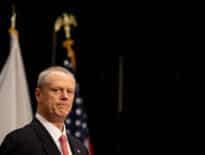Timothy Flacke
Co-founder and executive director, Commonwealth
Age: 49
Industry experience: 20 years
As the coronavirus outbreak started to spread, researchers at Commonwealth, a Boston-based nonprofit that promotes financial security nationwide, shifted fieldwork already in progress. They began evaluating how the economic crisis had affected low- and moderate-income individuals and households.
Commonwealth’s co-founder and executive director Timothy Flacke said the results showed three groups of people: those who have lost a job or experienced some financial impact from the crisis, households where at least one member has been directly affected, and people who still have a job but are spending more money on items such as groceries or internet upgrades to support work and classes at home. Many people in each group have minimal or no banking relationships, and Flacke said banks and credit unions have opportunities, even during a financial crisis, to help them start building financial security.
Q: How is the current crisis affecting financial security?
A: I think it’s important to start thinking about that by asking: Where were we before the crisis hit? And the answer is that we were remarkably financially precarious, many of us, and there are a lot of data points that make that case. We’ve seen estimates that say between half and 78 percent of workers report that they’re living paycheck to paycheck. We’ve seen the Federal Reserve statistic that about 40 percent of us could not come up with $400 in savings if we needed it. Last year’s government shutdown was another reminder – 800,000 federal workers, most of whom are pretty well–paid, were really struggling to miss one or two paychecks.
As we come into this crisis, most of us just don’t have a lot in reserve. We’re not particularly well–positioned to handle disruptions and shocks. Events are unfolding day by day, but we’re already seeing some people have almost overnight lost their income entirely, depending on the industry. And by and large, people are just not in a position to absorb those kinds of shocks.
Q: What is Commonwealth focusing on for these individuals?
A: We now know that households – not everybody, but large numbers of people – are going to be receiving federal relief checks. One thing we’ve done a lot of work on over the years is how to manage windfalls in the form of large federal tax refunds. For many working people, that’s actually an enormous financial event. What we know is that people need support in getting the most out of that. Simple concepts like mental accounting, having more than one bucket or envelope to hold your money, actually make a difference.
Most of us recognize we’re going to need some of that right away. We also have a desire and an instinct to hold on to as much of it as we can. So, it’s important to get those messages out to people now that when they receive those checks or direct deposits, they as much as possible make an intentional choice about how much they want to let go directly into spending and how much they might want to set aside.
Q: What can banks and credit unions do?
A: For [banks and credit unions], many of whom are in a position to know when those deposits land in accounts, there’s an opportunity to get ahead of that and maybe even go so far as say, “Would you like a reminder when the check arrives, when the direct deposit arrives?”
Back to those different groups that we’re seeing, if you haven’t already lost your job or had a huge disruption, I think there’s some evidence that many of us are – and we should be – kind of getting ready for what may be coming. Even though it’s tempting to feel like the crisis has already hit, and that it’s too late to get ready for it, at the household level in some cases that’s not true. [Banks and credit unions] have an opportunity – maybe even a responsibility – to get that message out to customers and say, “What can we do to help you get that emergency savings account set up? How can we help you to get ready?”
Q: How can financial institutions work with those who are unbanked?
A: One thing that’s been widely documented is that the lower your income and the fewer resources you have, somewhat ironically, the more that you’re likely to pay for financial services. When those stimulus checks arrive, some people are going to get physical checks, which probably means that they’ll wait a lot longer, and then they’re going to pay some amount of money to turn that into a useful form of currency. That is not a good use of these precious funds at the household level or at the broader society level.
I would encourage banks to think about what role they can play in making the maximum amount of those checks end up in household’s pockets. Government checks, I think, are generally among the less risky to consider cashing, so that might be an opportunity for some banks to clearly broadcast that they see this as a “we’re all in it together” moment. They might be open to cashing checks for noncustomers or marginal customers.
Q: What else can financial institutions do?
A: A lot of people perceived banks as the villains in the 2008 crisis, and this is really an opportunity. How can they be the heroes? What can they do to remind their customers and the community that they play a vital role in that they’re performing a service that we all need?
There’s a spectrum between un- and underbanked. I imagine that many banks have a number of customers who are inactive and, for many different reasons, choosing to do their primary transaction tool through a prepaid card or some other means. So, there may be an opportunity to dust off those lists of inactive customers and message them and say, “You’re probably getting this payment. Now is the time to give us another shot. We’re going to do everything we can to get those funds to you as quickly as possible with as little cost as possible.”
Flacke’s Five Favorite Shelter–in–Place Activities:
- Real meal preparation
- Family puzzles
- Tackling a backlog of home repairs
- Discovering new Netflix shows
- Drive–throughs of all kinds




 |
| 

